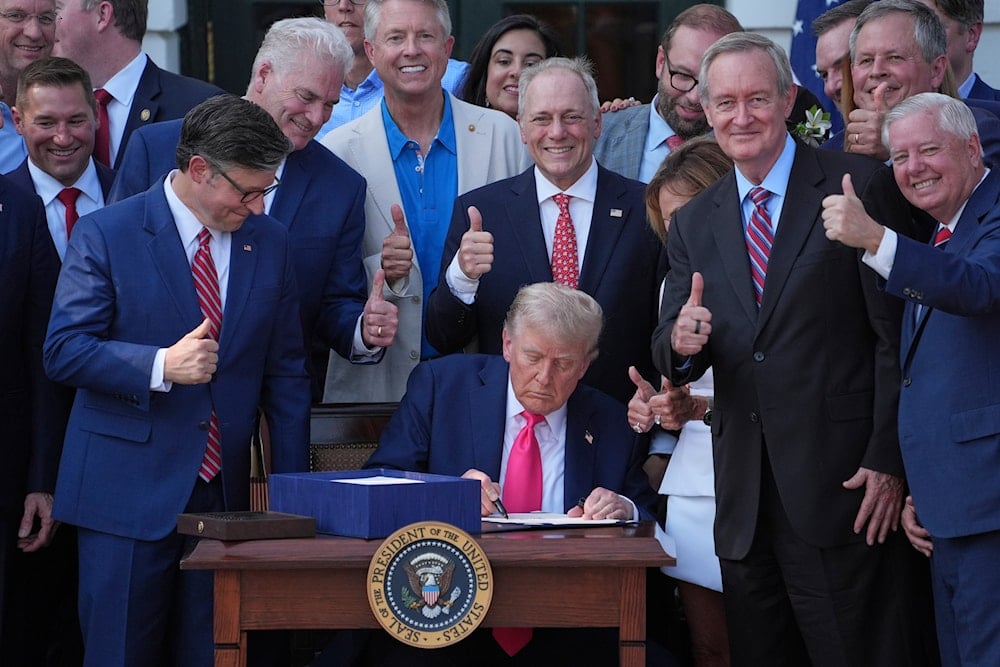Trump signs massive tax-and-spending bill into law
The US president has signed his spending bill into law, cutting funding to several important welfare programs and directing them toward immigration enforcement.
-

President Donald Trump signs his signature bill of tax breaks and spending cuts at the White House, Friday, July 4, 2025, in Washington (AP)
US President Donald Trump signed a major spending package into law Friday during a White House Fourth of July picnic, enacting deep cuts to federal safety-net programs while significantly increasing funding for aggressive immigration enforcement
Standing next to his wife, Melania Trump, during the picnic, Trump boasted about the bill's passage, claiming, "It’s the most popular bill ever signed in the history of the country," while emphasizing the unprecedented nature of the legislation by stating, "What we’ve done is put everything into one bill—we’ve never had anything like that before."
Trump framed the legislation's passage as a "birthday present for America," despite strong opposition from Democrats who voiced their displeasure with the spending package, later addressing supporters at a campaign-style rally in Iowa on Thursday evening.
Flanked by supporters, including House Speaker Mike Johnson, Trump signed the bill into law with the ceremonial gavel Johnson had presented for the occasion.
Following months of negotiations, the legislation narrowly cleared the Senate by a single-vote margin before advancing through the House on Thursday with a 219-213 vote, as just two Republicans broke ranks to oppose the measure.
What does the bill change?
The legislation deepens the tax reductions initiated by Trump's 2017 tax cuts, incorporating temporary exemptions for tips, overtime pay, and car loan interest, however, analysis by the Center on Budget and Policy Priorities reveals the package disproportionately favors wealthy Americans, with the most substantial tax benefits flowing to the nation's highest earners.
The law also introduces new restrictions on Medicaid, the federal health insurance program for low-income and disabled individuals, along with changes to SNAP, commonly called food stamps, which helps low-income families afford groceries.
According to researchers, the Medicaid reductions could result in up to 11.8 million individuals losing healthcare coverage, while approximately 8 million people may see their SNAP benefits eliminated, as critics warn that the Medicaid changes could create significant widespread consequences for the nation's healthcare system.
Democratic Senator Raphael Warnock criticized the legislation on social media, calling it a blatant theft that takes from ordinary citizens to benefit wealthy individuals, arguing that the Republican-backed measure essentially redistributes resources from the public to the affluent.
Millions stripped of health care.
— Senator Reverend Raphael Warnock (@SenatorWarnock) July 4, 2025
Higher premiums for the middle class.
Rural hospitals shuttered.
Nursing homes shutdown.
A shameful betrayal of working people for the sake of billionaires.https://t.co/a7GgAdn9He
Proponents of the bill, however, argue that the Medicaid cuts aim to address wasteful spending and abuse.
$170 million to immigration enforcement
The spending package includes a substantial $170 million allocation for immigration enforcement, representing a significant investment that would bolster the Trump administration's efforts to implement large-scale deportation operations, as part of its broader immigration agenda.
“This disgraceful, anti-immigrant budget hands the Trump administration a blank check to further ramp up its shameful efforts to terrorize American communities and separate families,” the Executive Director of the National Partnership for New Americans, an immigrants’ rights organization, Nicole Melaku, told The Guardian.
Melaku slammed the legislation for diverting resources from healthcare access to fund corporate tax cuts and immigration enforcement expansion, arguing the bill allocates billions to hire additional deportation officers, construct more detention facilities, and restrict legal protections rather than safeguarding public health.
Medicaid, SNAP budget cuts fund ICE raids
The Trump administration has significantly intensified immigration enforcement operations, directing additional resources toward these efforts while drawing criticism for its aggressive approach toward immigrant communities.
“This budget promises to supercharge US Immigration and Customs Enforcement arrests that disappear community members, leave children parentless and threaten constitutional and due-process rights for all of us,” Meg McCarthy, executive director of the National Immigrant Justice Center, told The Guardian.
According to a recent Guardian analysis, arrests of undocumented immigrants who have no criminal record have risen dramatically following directives from senior White House officials urging enforcement agents to escalate arrest operations.
Green energy slashed
The law cuts taxes, restricts Medicaid and SNAP, expands immigration enforcement, and eliminates Biden-era green energy incentives, undermining climate crisis efforts.
The law will expand the US budget deficit, provoking opposition from some Trump allies, as the nonpartisan Congressional Budget Office projects it will add $3.3 trillion to national debt by 2034, creating tensions with fiscal conservatives.

 4 Min Read
4 Min Read










